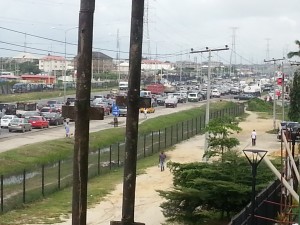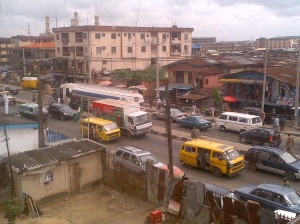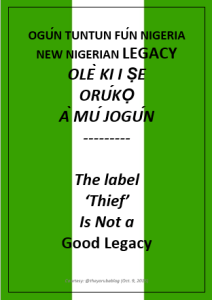Kòró/Kòrọ́nà – Ogun ti a kò rí: Coronavirus – the invisible war
Àjàkálẹ̀ àrùn ma ńṣẹlẹ̀ láti ìgbà-dé-ìgbà. Ni igba kan ri, àjàkálẹ̀ àrùn bi Ṣọ̀pọ̀ná/Olóde, Ikọ́-ife, Onígbáméjì àti bẹ́ẹ̀ bẹ́ẹ̀ lọ, ló kári ayé. Ni ọdún kẹtàlélógòji sẹhin, Ìkójọ Ètò-Ìlera Àgbáyé (WHO) ṣe ikéde òpin àrùn Ṣọ̀pọ̀ná/Olóde. Ọ̀pọ̀lọpọ̀ àwọn àjàkálẹ̀ àrùn àgbáyé yi, kò jà ju ọdún kan lọ, nigbati àwọn àjàkálẹ̀ àrùn àgbáyé miràn ṣi wa titi di àsikò yi. Àrùn Ikọ́-ife kò ti tán pátápátá ni àgbáyé nigbati àrùn Onígbá-meji ti kásẹ̀ ni Òkè-Òkun ṣùgbọ́n kò ti kásè kúrò ni àwọn orilẹ̀-èdè miràn.
Ni igbà ogun àgbáyé, wọn kò ṣe òfin onílé-gbélé. Ẹni ti àjàkálẹ̀ àrùn bi Ṣọ̀pọ̀ná/Olóde tabi Ikọ́-ife, ba nse ni wọn ńsé mọ́lé, ki ṣe gbogbo ilú. Ninu itan, ko ti si àjàkálẹ̀ àrùn ti o se gbogbo agbaye mọle bi ti eyi ti ó njà lọ́wọ́lọ́wọ́, ti Yorùbá sọ ni “Kòró” yi, nitori olóko kò lè re oko, ọlọ́jà kò lè re ọjà, oníṣẹ́-ọwọ́ tàbi oníṣẹ́ ìjọba, omo ilé-ìwé àti bẹ́ ẹ̀ bẹ́ ẹ̀ lọ wà ni àhámọ́. Àwọn Onímọ̀-ijinlẹ ṣe àkíyèsí pé inú afẹ́fẹ́ ni àrùn yi ńgbé, o si ńtàn ni wéré-wéré ni ibi ti ọ̀pọ̀ ènìyàn bá péjọ si. Ìjọba ṣe òfin “onílé-gbélé” ti kò gba àpèjọ ti ó bá ju èniyàn mẹwa lọ, èniyàn mẹwa yi ni lati fi ẹsẹ̀ bàtà mẹfa si àárin ẹni kan si èkeji, èyi ni kò jẹ́ ki ẹlẹ́sin Jesu àti Mùsùlùmi péjọ fún ìjọsin ni ọjọ́ ìsimi tàbi ọjọ́ Ẹti. Ọmọ lẹhin Jesu ko le péjọ lati ṣe ikan ninu ọdún ti ó ṣe pàtàki jù fún Ọmọ lẹhin Jesu, ọdún Ajinde ti ọdún Ẹgbàálélógún, Àrùn yi ti mú ẹgbẹgbẹ̀rún ẹmi lọ, o si ti ba ọrọ̀-ajé jẹ́ fún gbogbo orilè-èdè àgbáyé.
Ki Ọlọrun sọ “kòró” di kòrọ́nà gbe gbà lai pẹ́. Àwọn Onímọ̀-ìjìnlẹ̀, Oníṣègùn àti àwọn alabojuto-aláìsàn ńṣe iṣẹ́ ribiribi lati dojú ìjà kọ arun “kòró”. Ninu ìtàn àjàkálẹ̀ àrùn àgbáyé nigbati ko ti si abẹ́rẹ́ àjẹsára, a ṣe àkíyèsí pé àwọn iṣọ́ra ti wọn ṣe wọnyi wúlò lati gbógun ti àrùn Kòró.
Ànìkàngbé/Àdádó – Isolation
Àhámọ́ – Quarantine
Ìmọ́tótó – Good personal hygiene such regular washing of hands
Li lo egbogi-apakòkòrò – Using disinfectants
Onílégbélé/Dín àpéjọ kù – Stay Home/Avoid large gathering
Bi bo imú àti ẹnu – Wearing mask
ENGLISH TRANSLATION
Pandemic is not new in the world, as it occurs from time-to-time. Smallpox, Tuberculosis, cholera Etc. were once upon a time a pandemic ravaging the world. The World Health Organization declared the eradication of Smallpox on December 9, 1979. Tuberculosis has not been completely eradicated while Cholera has been drastically contained in the developed world with some cases still occurring in the developing world. Continue reading
Originally posted 2020-04-16 01:09:11. Republished by Blog Post Promoter










